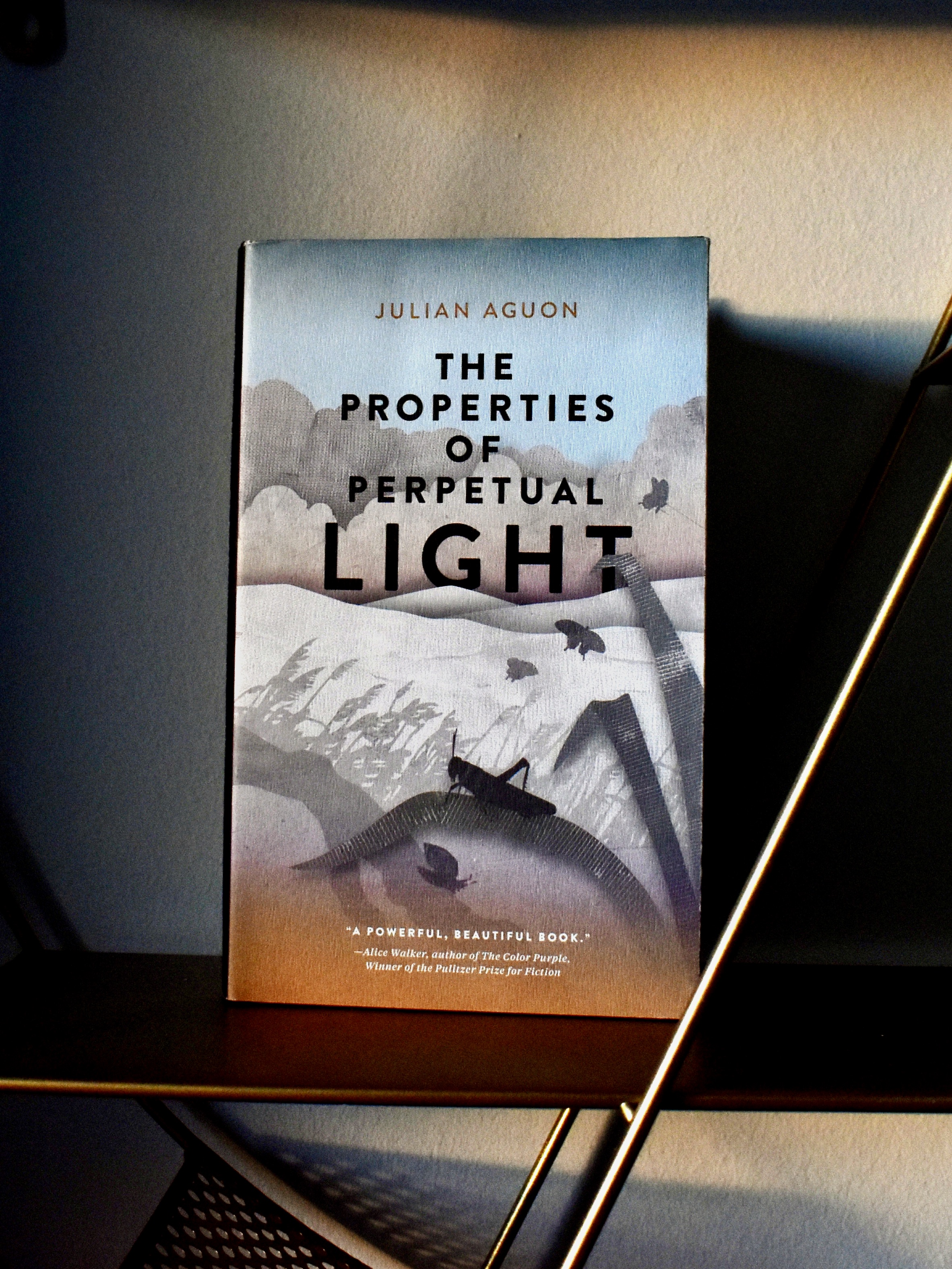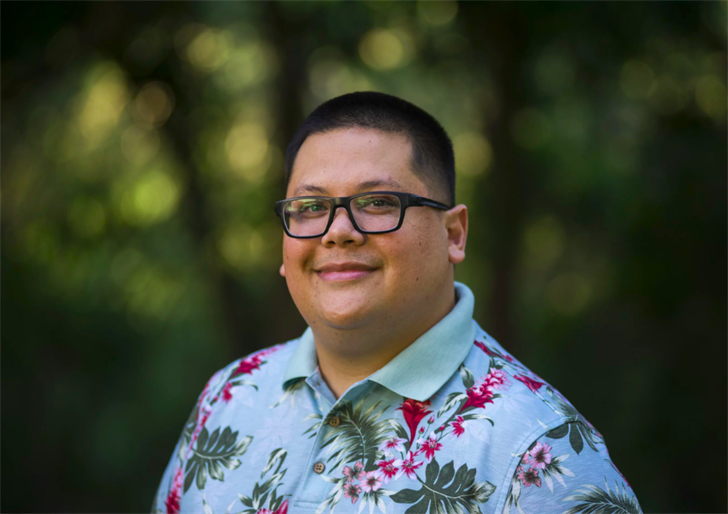Published January 24th, 2022
Review
by Andrea Färber
Coming to terms with loss and what it means to grow up in a country that is never truly one’s own, The Properties of Perpetual Light (2021) is a thoughtfully compiled collection of stories and poems by Guam-native and indigenous human rights lawyer Julian Aguon.
For many of us, books are a place of refuge. Especially in trying times we seek out the stories that give us hope and comfort, those that offer us an escape from real life, even if it is just for a short time. I did not find The Properties of Perpetual Light when browsing the local bookstore. Instead, it unexpectedly found me at the end of a difficult day, a gift in my postbox, sent by the team of an academic workshop I attended last summer that was centered around climate change in the humanities. It is a topic that leaves many of us feeling hopeless for the future, but to then receive this book and the many stories and poems contained within felt like a sign that not all is lost yet.
The Properties of Perpetual Light is a collection of 22 stories and poems. The book ranges from political activism to childhood memories, from tales of growing up in Guam to commencement addresses and a eulogy. Most importantly, the theme of loss snakes through it, both blunt and hidden between the lines — loss of childhood innocence, loss of nature, loss of political autonomy, loss of life. Nevertheless, it also sows the seed of hope in our hearts, for Aguon shows that one can wage a war for justice with words of kindness.
Aguon is a writer as well as an indigenous human rights lawyer from Guam. Guam is an island in the North Pacific Ocean. It is a part of Oceania, but it is also an unincorporated territory of the United States of America. While people who were born in Guam are American citizens, they are not allowed to vote in presidential elections as long as they reside on the island. For Aguon, Guam is home. It is the place he grew up in, the culture that runs through his blood, the memories he harbors of childhood and the red string that runs throughout this book. He paints the Guam of his memories as a magical place in poems such as “Go With the Moon” and “More Right,” only to juxtapose them with stories and poems coming to terms with the death of his father or a negative experience he had during ninth grade. Other stories such as “No Country for Eight-Spot Butterflies” thematize the increasing militarization of his homeland by the U.S. which threatens the destruction of more than 1,000 acres of native forest and starts with the chilling sentence “In Guam, even the dead are dying.” “Birthday Cakes Mean Birthdays,” which was written when North Korea threatened to bomb Guam and all media outlets flocked there for a week, paints the island as no more than a place that is used as a piece in a political game of chess.

The story that struck me personally as most profound is “The Gift Anne Gave Me.” In it, Aguon laments that civic engagement has become synonymous with electoral politics, and that because we focus so much on politicians in our history books, we have lost all memories of our ancestors. Detailing the leper colony established on Guam by the Navy in the early 1900s, Aguon shares the story of two patients — one who could not walk, and one who could not see — fleeing together from the colony they were held at shortly before they were to be deported. They managed to hide for a month in the jungle. When Aguon recalls the story, he does so with excitement and pride. He thinks these two patients are the ancestors that should be remembered in the history books, as they were standing up to people trying to imprison them despite their handicaps, and he remarks that, “I nearly broke in half looking up at their brave faces.” It is this dealing with the past of his own country, finding pride in those ancestors that have deliberately been erased from history books, that especially highlights Aguon’s fervor for social justice.
In the first chapter, an introduction for what is yet to come, Aguon calls this book “an homage of sorts to the work of the activist-writer, which is the work of bearing witness, wrestling with the questions of one’s day, telling children the truth.” Aguon is one of these activist-writers himself. He does not shy away from speaking the truth and discussing unjust cruelties. In “Fighting Words,” a commencement speech he gave to the graduating class of the University of Guam in December 2018, he addresses the violence erupting not only in his country but around the world, and the fact that we are so immobilized by it that we can no longer speak up. Allowing himself to be vulnerable, Aguon recalls his own moment of silence, which dates back to when he found out that his grandmother was cruelly held captive by his uncle after being diagnosed with an illness, before his family took her in. He decided to share this story because he believes that, as a writer, it is part of his work to be brave. He says that writers should speak out, “if not to rescue everyone, then to help as many people as possible rescue themselves, by rescuing back language itself.” His speech imparts the importance of using fighting words and owning a fighting spirit to break the silence and repair a broken world. It is an empowering speech, that at the end of reading leaves a writer itching to take pen and paper and go change the world one word at the time as well.

Aguon does not shy away from writing about provoking and political topics, from the threat of being a target for nuclear weapons to climate change and the exploitation of his home by the United States. In “The Ocean Within,” a speech for the graduating class of a high school in May 2010, Aguon states that “We in Guam have had enough of that.” I think that this sentence sums up the message of the book best. It is a homage to activist-writers who write in order to better the world, a homage to the people who have positively influenced Aguon’s life, and a homage for his home. The Properties of Perpetual Light tells tales of happiness, but even more so of loss and pain. Nevertheless, it shows that this pain can be transformed into something meaningful and that silence should never be an option.
Nationality: Austrian
First Language(s): German
Second Language(s):
English,
Spanish,
Japanese
Supported by:


Comments on "“In Guam, even the dead are dying” — A Review of Julian Aguon’s "The Properties of Perpetual Light""
Please log in to submit a comment.
Login